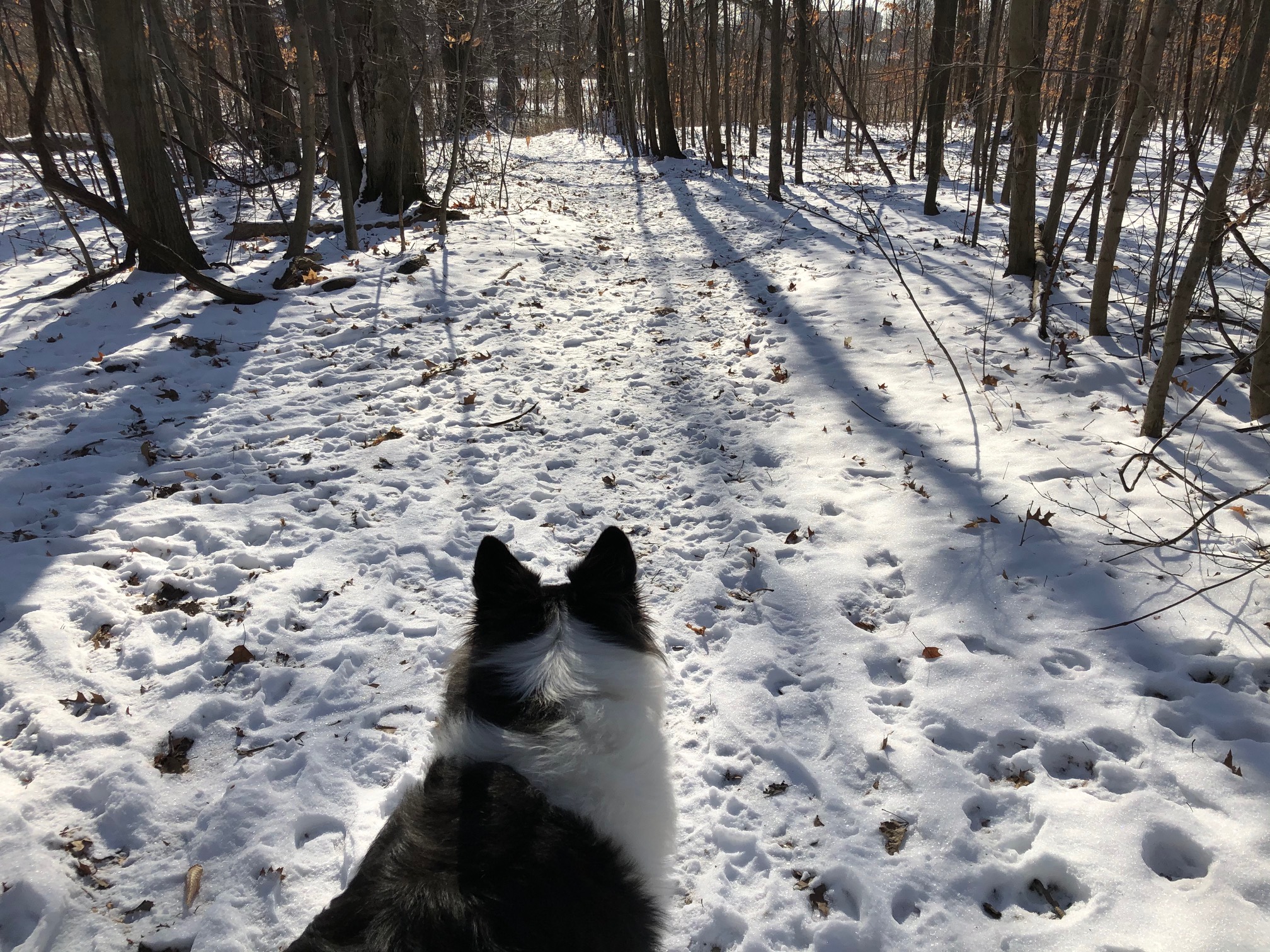I was wearing so many bulky layers to onlookers I was either about to exit the airlock of the International Space Station to begin my space walk or I was geared up to walk the dog on a snowy January morning in Canada. Life in Canada doesn’t stop for snow, and neither does a dog’s bladder so a walk it would be. Skye and I had the winter walk routine down: fortifying cup of coffee, podcast at the ready, once around the block, and a second cup of coffee to warm up before I dropped the girls off at school. We began our walk unawares that this one would end very differently.
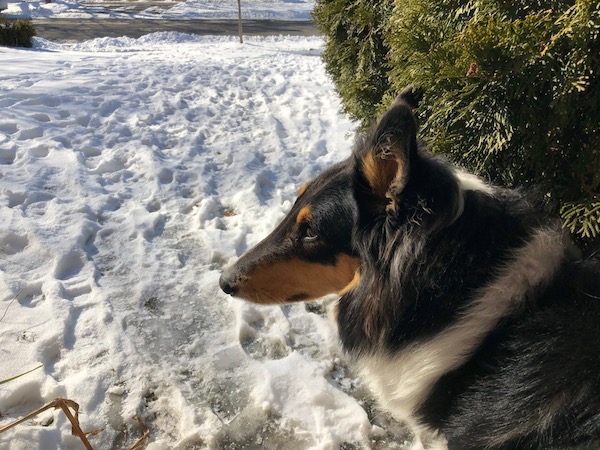
As I led Skye off the deck I stepped tentatively onto our concrete patio checking for icy patches. Some of the melted snow had frozen solid overnight, but it wasn’t a significant amount or much of a hazard so we continued on our way through the gate and around to the front yard. We followed the sloping topography of the yard down to the sidewalk. As we walked I began mulling over tensions at church and errands I needed to run that day. I hit play on my podcast and stepped onto the sidewalk. Suddenly the sidewalk slid out beneath me and I found myself lying in the snow, my arm in excruciating pain.
“No, no, no, no no!! I don’t have time for this!” was my first thought. I had to get the girls to school and my New Year’s resolution was to write more, which I couldn’t do with a broken right arm. I began mentally scolding myself, “How could I have been so stupid not to check the sidewalk for ice?“ “If I had been watching my step instead of fretting about church gossip, I wouldn’t have fallen!” and finally, as my body started sliding into shock, “I need to rewind!” But I couldn’t rewind, I couldn’t go back to the moment before I stepped onto the invisible black ice coating the sidewalk. I had to go forward up the incline to the house, forward into figuring out what to do about my oddly bent wrist, forward into a new story. I wrangled Skye and trudged through the snow to the house.
“Berating and blaming myself was not going to get me where I needed to go, so instead I focused on the events of my fall that would”
Berating and blaming myself was not going to get me where I needed to go, so instead I focused on the events of my fall that would. Skye didn’t run. That was step number one. She is a dog who loves to play chase, but when I fell she stayed right with me, doing her best Lassie impersonation to sound the alarm and alert Todd that something was wrong.
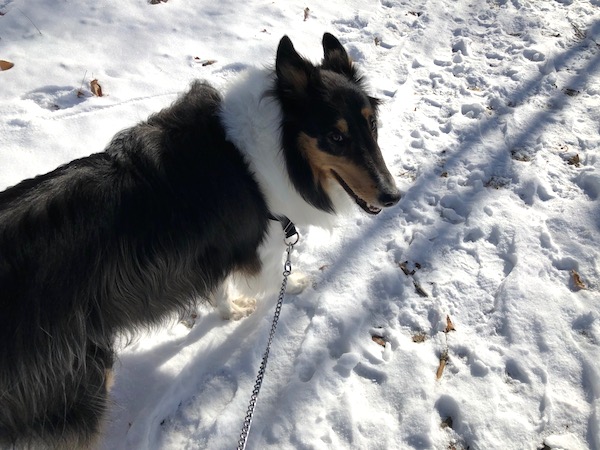
Second step into my new story: I didn’t fall far from the house, so I didn’t have far to go to get help and, even more importantly, I didn’t hit my head. Not hitting your head is crucial in Canada. It’s the first thing everyone asks when they hear you’ve fallen, “Did you hit your head?” Many Canadians fall every winter on icy streets or hockey rinks and sustain serious head injuries. The third step was, that unlike a trip to the emergency room in the United States, my time in the Toronto ER would be totally covered by our Ontario healthcare.
And so it went: emergency room, fracture clinic, x-rays, surgeon consults, a couple of casts, and finally surgery to insert a metal plate that would hold the bones in place as they healed. Each step forward through the ordeal of my broken wrist required new chapters in the story. Sometimes I would focus on the person helping me, like the orthopedic technician cracking jokes while setting my cast, or the brilliant surgeon who bragged I had the smallest wrist she had ever operated on, called me at home to check up on me after surgery, and worked me in every time I needed a cast adjustment. I was thankful that I had another opportunity to see my mother, who flew up from Tennessee to help us. Other times I would focus on positive things like all the writing I was getting done in spite of my fall, maybe even because of it since there wasn’t much else I could do. I had become quite adept at typing with my left hand while balancing an ice pack on my elevated right hand.
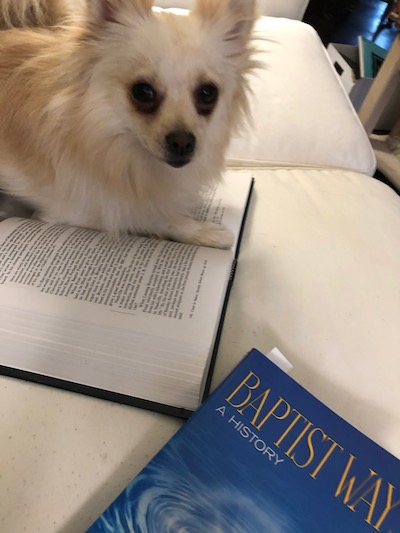
I will confess that I am not one of those people who naturally looks on the bright side. This reframing of events into a narrative that will help me move forward does not come easily to me. In fact, like that trek back to the house through the snow, it’s often a painful slog. The trauma in my life has worn physical grooves in my brain and in my psyche, so when a crisis hits, it’s like the needle from a record player drops into that groove and starts playing my Greatest Hits of Regret. My negative thoughts spin around and around, and it’s not unusual for that needle to skip and repeat the worst ones over and over. That’s when I have to intentionally switch up the narrative from the negative story of blame and regret to a hopeful story centered on the goodness of God, of other people, and even the dog if necessary!
In a larger way, this is what the Apostle Paul is talking about in Romans 12:2:
Do not be conformed to this world, but be transformed by the renewing of your minds, so that you may discern what is the will of God—what is good and acceptable and perfect.
But before we can craft a new story, we need to find our place in the larger story of God’s relationship with Israel and the world. Paul summarizes it this way in chapter 11: God has not rejected God’s people (v.1) and through God-initiated grace comes the redemption of God’s people (v.6). Then Paul turns to his Gentile audience and situates their story in this larger story by comparing them to an olive tree: Out of God’s kindness, God has “grafted” Gentile branches into the tree of Israel (vv.17-22), both branches are the recipients of God’s mercy (vv30-32), and just how or why this is, no one can say, because no one is equal to God (vv.33-35).

So, like any family tree, when I follow the branches out far enough I find my own perch. By God’s grace I have been grafted in. I am a distant sprig on Paul’s metaphorical olive tree. Therefore what applies to the rest of the tree applies to me as well: I have not been rejected by God, I am redeemed by God’s grace and I too receive God’s kindness and mercy. Understanding these truths gives me the footing I need to mentally pivot to a narrative that is going to draw me forward. I can’t trust in my own strength and I certainly can’t trust the record of doubt and doom playing in my brain. Only when I remember that God, the source of all things (v.36), is also the source of my strength and that God, with whom there is no equal (v. 35), chooses to love me do I then have something positive outside myself even greater than the negativity inside of me. Only then is my mind is in a position to be renewed and myself transformed.
“With my refocused and renewed mind, not only can I reshape the narrative from one of failure to one of hope for myself, I can let God’s mercy and grace extend beyond myself to those around me.”
With my refocused and renewed mind, not only can I reshape the narrative from one of failure to one of hope for myself, I can let God’s mercy and grace extend beyond myself to those around me. In chapter 12, Paul is calling on the Christians in Rome to worship God with their lives and actions and he outlines what that should look like:
Let love be genuine; hate what is evil, hold fast to what is good; love one another with mutual affection; outdo one another in showing honor. Do not lag in zeal, be ardent in spirit, serve the Lord. Rejoice in hope, be patient in suffering, persevere in prayer.
Paul’s list goes on for several more verses – these are just a few of his examples – but they all hinge on having a renewed mind that can discern “what is the will of God—what is good and acceptable and perfect” (v.2). Ultimately God’s will is for everyone to know God’s love. My demonstration of that love requires that I view others as also people who are part of God’s bigger story and worthy of the same love and grace I have received. So, when I operate from that place of God’s love for me and focus on a narrative consistent with that love, it frees me up to act in God’s love toward others.
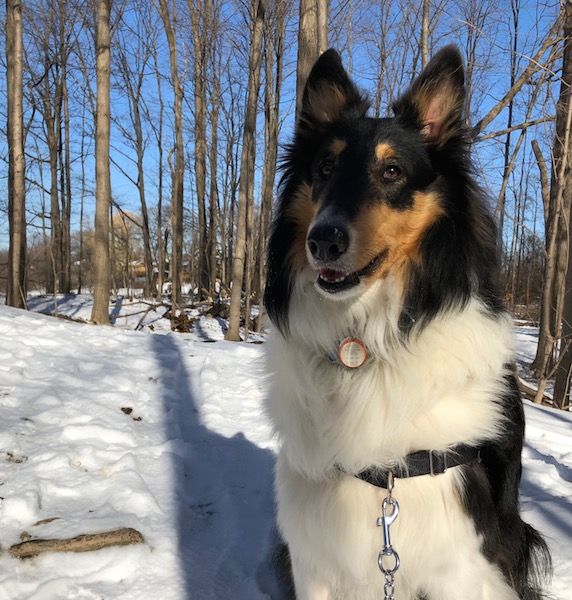
When I focused on what a great job Skye did staying with me after my fall and made that the narrative, I could be more present for my daughters who needed to stay calm and finish getting ready for school. If my brain had been playing the blame game, and I had let that story take over, I’m not sure I would have been able to give them the encouragement they needed at that moment. I don’t think I could have maintained an upbeat attitude and acted with kindness toward the doctors and nurses who worked hard to help me. If I had let my story be one of regret, I would have given up on my resolution to write each day. And I certainly wouldn’t have had the energy and passion to do the deep digging required to unearth the racism of early Baptists, much less the compassion to go beyond that to search out ways churches could make past wrongs right. That is the good and acceptable and perfect will of God from Romans 12:2.
Such renewal isn’t a one-time exercise. I wish it were, but more often than not it’s a daily, hourly, sometimes minute by minute choice to live into a different story. This is especially true if you are in pain with an itchy cast the length of your arm that you must keep elevated even while you sleep. Even now, when all that is left is a three-inch scar on my wrist and a metal plate inside it, it’s still hard for me not to give into negativity. But just like that metal plate in my wrist kept my shattered bones aligned so they could heal, each time I choose a better story I’m bringing my spirit into alignment with God. When that happens, I’m one step closer to wholeness and home.
Note: Reframing your story is not a substitute for getting professional help when you need it. All the positive focusing in the world is not going to raise the levels of serotonin in my brain or yours. Anti-depressants, therapy, yoga to calm anxiety–all these things working in tandem create a space where you can begin to see your worth in God’s eyes and your place in God’s story.



















